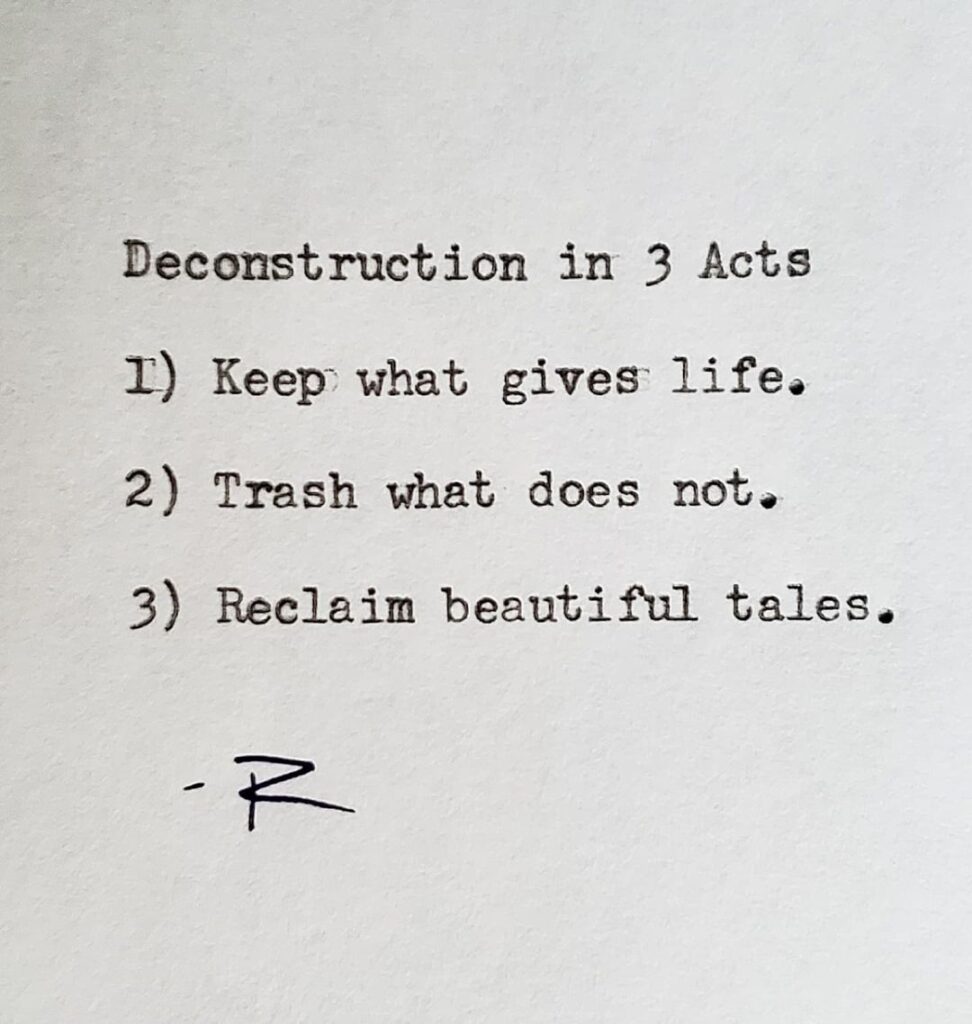As many of you know, I’m somewhat of a connoisseur of deconstruction. My next book will include a deep dive into deconstructing faith.
Deconstruction is so hot right now that white thought leaders are finding ways to monetize it, and fundamentalists are finding ways to malign it. You know it’s a big deal with big evangelical media start churning out “concerns” about a particular topic.
Deconstruction is not particularly new, but it’s gaining widespread popularity, generating more interest with social media and pandemic changes. There were two web articles on the subject that came through and I decided to chime in. Mostly because deconstruction, as with so many trends, is dominated by those white thought leaders. The massive popularity around hashtags of #exvangelical and #deconstruction as an example. Some of it is helpful. Some of it generated as a means for eventual profit….
This past week two articles came out, one from TGC and one from CT. I want to address them both and then offer my take. They both, in my opinion, miss the mark.
Tish Warren begins on CT: https://www.christianitytoday.com/ct/2021/november/exvangelical-warren-guide-to-deconstruction-church.html
I agree with the pieces of her argument, but reject the fundamental thesis that deconstruction shouldn’t happen, rather the church should embrace reformation. It’s a bit shortsighted. Firstly, deconstruction doesn’t come from the power-seat of evangelicalism (or whichever tradition). It doesn’t have the means to actually destroy the church, which seems to be the underlying concern. This isn’t to say deconstructionists don’t have impact. In an age where consumer Christianity dominates, voting with your feet and leaving en mass will have an impact. Secondly, we shouldn’t downplay the need for deconstruction replacing it with a watered down version of reformation. The institution should be interrogated to its very bones. The argument also undermines marginalized voices. Simply put, the notion we can reform implies the bones are worth saving. But marginalized folks, especially racialized minorities, have been calling for substantive change for decades, if not centuries. WE’RE TIRED OF WAITING, and calling for reformation (which would be great if it actually happened), doesn’t go far enough. It’s a suggestion that comes from a position of privilege. It’s justice NOW, not whenever the institution deems is absolutely necessary, and even then only in pieces.
Reformation won’t lead to the right changes because the two foundations of modern churches, and ultimate root sources that catalyze deconstruction are:
PATRIARCHY & WHITE SUPREMACY.
Neither are listed in the shallow article put out by TGC entitled ‘4 Causes of Deconstruction’.
If you know you know. If you haven’t read it, don’t. Nothing like undermining deep questions about white evangelicalism (et al) with shallow perspective. But that’s typical of contemporary Christianity. It can only spot what it’s built to produce.
Definitions
Social media voices (#exvangelical etc) seem to question whether we can define deconstruction at all. I think we should try. But I also acknowledge what deconstruction avails: unique experiences that build unique journeys unto future liberation.
So what’s deconstruction? This isn’t built into stone tablets but my take:

Deconstructing faith in 3 acts.
ACT 1
Keep what gives life.
ACT 2
Trash what does not
ACT 3
Reclaim beautiful stories.
Repeat.
Note, these 3 stages are unpacked in my book, “When We Belong”.
Note that the call isn’t to destroy or deconstruct the whole. I surmise it COULD when it comes to institutional structures, but that would also imply there’s nothing worth RECLAIMING from the subversive way of Jesus built for, let’s not forget this, MARGINALIZED people. Not white Christians and their tokens who push themselves to the margins, rather marginalized folks who must assimilate to the demands of the two foundations above in order to have a taste of belonging. Ya dig?
So what are the catalysts of #deconstruction? All the things that seek to make you less whole. That also means the thing about deconstruction: it’s a pursuit to find true BELONGING.
The search for belonging leads to our ultimate liberation from all that seeks to make us less whole.
So those are my thoughts on deconstruction, what it is, where it takes us, and why it’s good. I encourage you in your own journey to find BIPOC voices leading this charge. White leaders can’t take you through the dismantling of white supremacy (or they can, just not far enough, which is why reformation won’t work in full).
